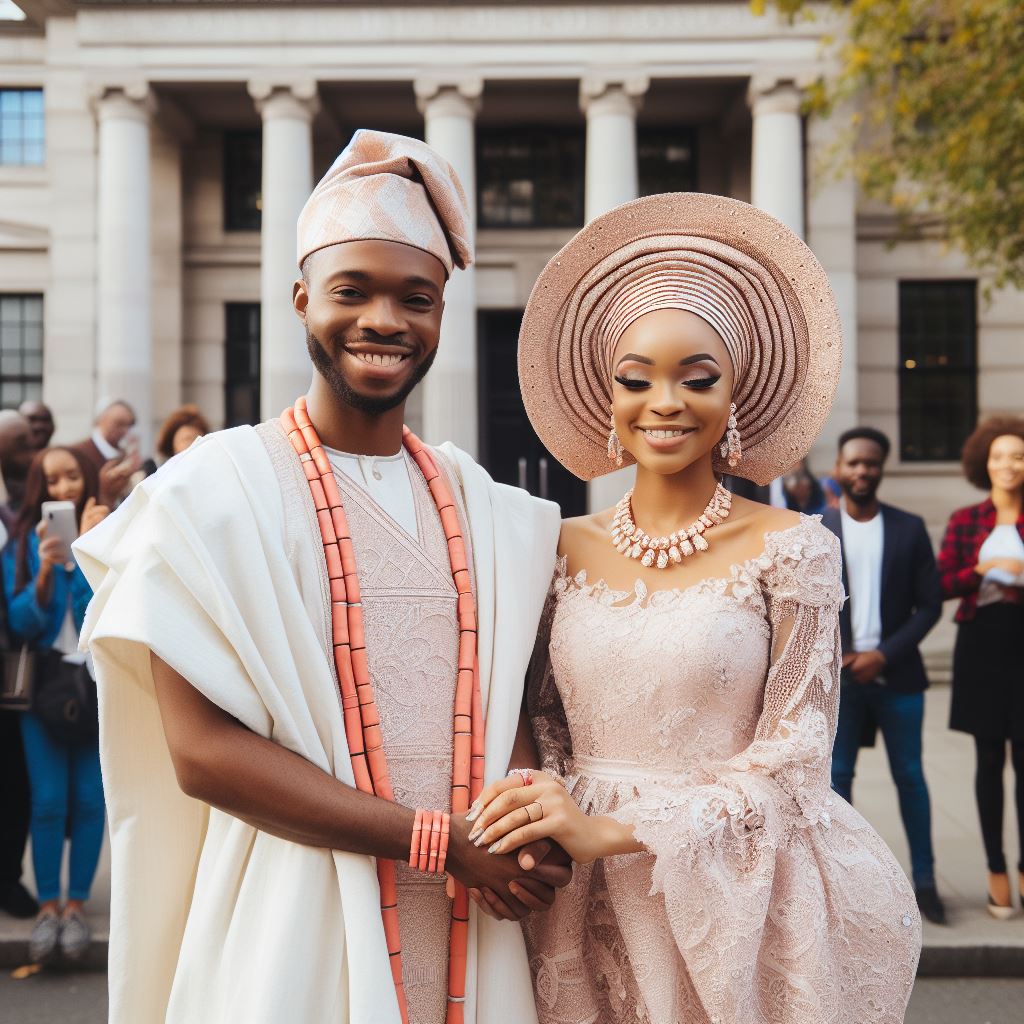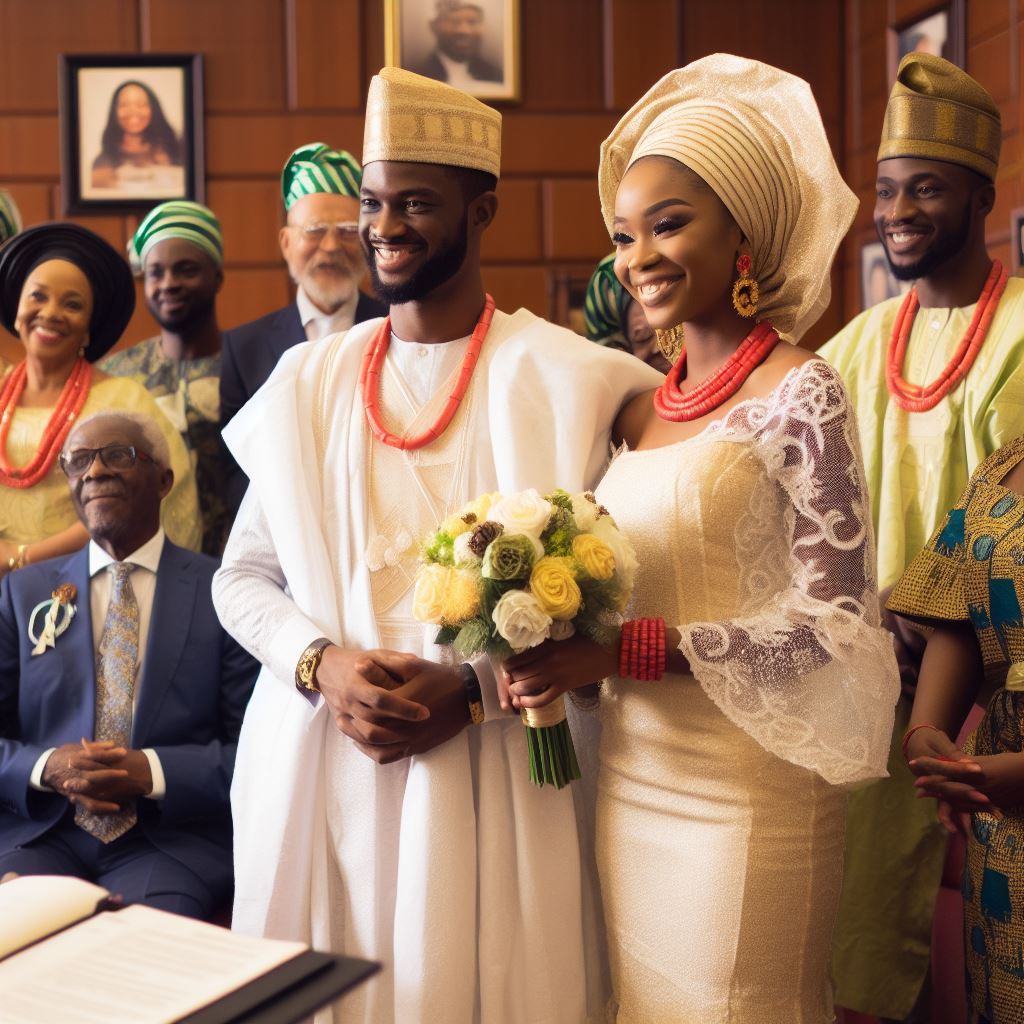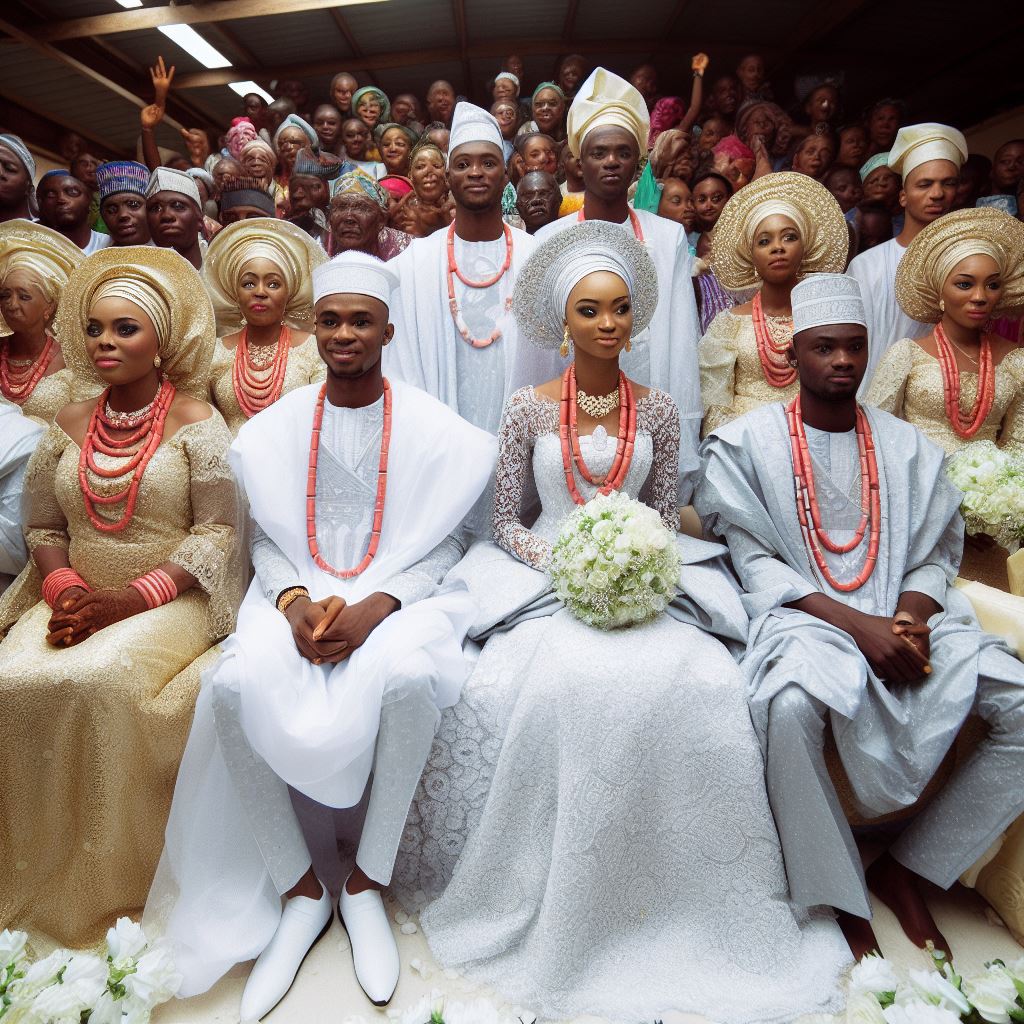Introduction
Steps to Register a Marriage by Ordinance in Nigeria mark the initiation of a beautiful journey.
Registering your marriage through these essential steps is a vital process in Nigeria.
This legal process has significant implications for you and your partner.
It ensures your union is recognized by the law, protecting your rights and obligations.
Why Registering a Marriage by Ordinance Matters
Registering a marriage by ordinance is more than just a formality.
It grants you legal rights to your spouse’s property and inheritance, making you a recognized next of kin.
It also offers legal protection in case of divorce or separation.
The Steps to Register Your Marriage
The registration process involves several key steps:
- Preparation: Gather necessary documents like birth certificates, passports, and statutory declarations.
- Notice of Marriage: Submit a notice at your local registry office, announcing your intention to marry.
- Waiting Period: There’s typically a 21-day waiting period after the notice is filed.
- Registrar’s Certificate: After the waiting period, obtain a Registrar’s Certificate of Marriage.
- Solemnization: Have your marriage solemnized in the presence of a registered officiating minister.
- Marriage Certificate: After the solemnization, you’ll receive your marriage certificate.
- Legal Recognition: With this certificate, your marriage is legally recognized, and you can enjoy the rights and obligations that come with it.
In this guide, we’ll delve deeper into each of these steps, providing you with all the information you need to successfully register your marriage by ordinance in Nigeria.
Step 1: Gathering Required Documents
To register a marriage by ordinance in Nigeria, you will need to gather certain documents as part of the registration process. These documents include:
- Birth Certificates: You and your partner will need to provide original copies of your birth certificates.
- Valid Identification: Both partners must have valid identification documents, such as national identity cards or international passports.
- Proof of Residence: You will need to provide proof of residence, which could be in the form of utility bills, bank statements, or a letter from your landlord verifying your place of residence.
It is important to note that these documents must be original copies and not photocopies.
In addition, they should be in good condition and free from damage or alterations.
Where to obtain these documents
To obtain these required documents, follow the guidelines outlined below:
- Birth Certificates: Contact the local government authority in the district where you were born. They will provide you with the necessary forms and instructions for obtaining your birth certificate.
- Valid Identification: Visit the nearest National Identity Management Commission office or passport office. They will guide you through the process of obtaining a national identity card or passport.
- Proof of Residence: Contact your utility service providers (electricity, water, etc.) and request original copies of your utility bills. Alternatively, you can visit your bank to obtain official bank statements. If you are renting, ask your landlord to provide a letter confirming your residence.
Specific requirements for each document
Each document has its specific requirements, which you must fulfill. Here are some important points to consider:
- Birth Certificates: You may be required to present an affidavit from a legal practitioner as proof of your birth if your birth was not registered within the required timeframe.
- Valid Identification: Ensure that your national identity card or passport is valid and has not expired. If necessary, renew it before beginning the registration process.
- Proof of Residence: The utility bills or bank statements should bear your name and address. If the bills are in another person’s name, you may need to provide additional documents proving your connection to the address.
By gathering all the required documents and fulfilling the specific requirements for each, you will be ready to proceed to the next step of the marriage registration process in Nigeria.
Read: Expert Tips for a Smooth ‘Marriage by Ordinance’ Registration Process
Step 2: Schedule an Appointment
Importance of scheduling an appointment
Scheduling an appointment with the designated marriage register office is an essential step in the process of registering a marriage by ordinance in Nigeria.
It ensures a smooth and organized procedure, allowing both parties to plan accordingly.
The appointment is crucial as it enables the marriage register office to allocate time and resources to process your application promptly.
It also allows them to provide personalized assistance and answer any queries you may have regarding the registration process.
Process of making an appointment
To schedule an appointment, you need to contact the marriage register office responsible for your area.
You can find their contact information on the official website of the National Population Commission (NPC) or by visiting their office in person.
It is advisable to inquire about the office hours when making your appointment.
The office hours may vary depending on the specific register office and location.
Knowing the opening and closing times will help you plan your visit accordingly.
Additionally, inquire about any applicable fees for scheduling an appointment.
Some register offices may have a nominal fee to secure a time slot for your application processing.
It is essential to be aware of these charges beforehand to avoid any surprises or delays in the process.
Checklist of information you may need to provide
When scheduling your appointment, it is important to be prepared. Here is a checklist of information you may need to provide:
- Your full names
- Residential address
- Phone number
- Email address (if applicable)
- Preferred date and time for the appointment
It is advisable to have a few alternative dates and times in case your preferred slot is already booked.
Flexibility in scheduling will help ensure that you can secure an appointment without unnecessary delays.
During the appointment, it is important to arrive on time and with all the necessary documents.
The required documents may vary depending on your specific circumstances, such as whether it is a first or subsequent marriage or if any of the parties are divorced or widowed.
Common documents needed for the appointment
Bringing all the required documents will help streamline the registration process and prevent any complications.
Some common documents needed for the appointment may include:
- Proof of identity (e.g., valid passports, driver’s licenses, or national ID cards)
- Birth certificates of both parties
- Passport-size photographs
- Divorce certificates (if applicable)
- Death certificates (if applicable)
It is crucial to check the official website of the National Population Commission (NPC) or consult with the marriage register office to confirm the specific documents required for your circumstances.
Generally, scheduling an appointment with the designated marriage register office is vital for registering a marriage by ordinance in Nigeria.
It ensures a smooth process and allows for personalized assistance.
Remember to gather all the necessary information and documents beforehand to facilitate a hassle-free appointment.
Read: Dealing with Family Pressures: Ordinance vs. Traditional Weddings
Step 3: Attend Counseling Sessions
Requirement of attending pre-marital counseling sessions
Once you have completed the necessary documentation for your marriage by ordinance in Nigeria, the next step is to attend counseling sessions.
These sessions are an important part of the registration process, and it is mandatory for couples to attend them before their marriage can be officially recognized.
Purpose of these sessions and the topics that may be covered
The purpose of these counseling sessions is to prepare and educate couples about the responsibilities and challenges that lie ahead in married life.
It is an opportunity for couples to better understand each other, discuss their expectations, and acquire the necessary skills to build a strong and lasting marriage.
During the counseling sessions, various topics may be covered to address different aspects of married life.
These topics can include communication skills, conflict resolution, financial management, intimacy, family planning, and understanding gender roles within the marriage.
The counseling sessions aim to provide couples with the knowledge and tools they need to navigate these areas successfully.
Guidance on finding counseling services and scheduling the sessions
In order to find counseling services, you can start by reaching out to your local government’s marriage registry or the religious institution where you intend to have your marriage solemnized.
They will be able to provide you with a list of accredited counselors or counseling centers in your area.
Once you have identified potential counseling services, it is essential to research their qualifications and experience.
You can request information on their areas of specialization and the approach they use in their counseling sessions.
This will help ensure that you choose a counselor who is capable of addressing your specific needs and concerns.
Schedule your counseling sessions
After selecting a counseling service, you will need to schedule your counseling sessions.
The number of sessions required may vary, but it is typically around four to six sessions.
It is important to book your sessions well in advance to secure the dates that are convenient for both you and your partner.
Be open and honest with your counselor
When attending the counseling sessions, it is crucial to be open and honest with your counselor.
They are there to guide and support you, and their objective is to help you build a successful marriage.
Participate actively in the sessions by asking questions, sharing your thoughts, and actively listening to your partner.
Complete the counseling sessions
Completing the counseling sessions is a significant step towards the registration of your marriage by ordinance in Nigeria.
It shows your commitment and readiness to embark on the journey of marriage.
Take advantage of this opportunity to enhance your understanding of each other and develop a solid foundation for your future together.
By attending counseling sessions, you are equipping yourselves with the necessary skills and knowledge to navigate the challenges that may arise in your marriage.
Utilize this time to strengthen your bond, establish effective communication, and lay the groundwork for a happy and fulfilling marriage.
Read: Top Venues for ‘Marriage by Ordinance’ Ceremonies in Nigeria
Step 4: Complete the Marriage Declaration Form
When it comes to registering a marriage by ordinance in Nigeria, one essential step is completing the Marriage Declaration Form.
This form holds significant importance in the overall registration process.
It is crucial to understand the significance of this form and ensure accurate and truthful information is provided.
The Significance of the Marriage Declaration Form
The Marriage Declaration Form serves as an official record of the marriage.
This legal document affirms the union of two individuals, gaining government and authority recognition. It serves as marriage proof, aiding legal matters, benefits, and dispute resolution.
Information Needed to Complete the Form
When completing the Marriage Declaration Form, certain key details are required to be filled in accurately.
These include personal information of both the bride and groom, such as full names, ages, occupations, addresses, and nationalities.
Additionally, the form may also require the inclusion of information about the witnesses present during the marriage ceremony, including their names and addresses.
Consent signatures are another crucial element of the Marriage Declaration Form.
Both the bride and groom must provide their consent by signing the form, affirming their agreement to the marriage.
This signifies that they willingly enter into the marital union and have legal consent to do so.
It is essential to ensure that both parties sign the form in the presence of witnesses and any person authorized to solemnize marriages.
The Importance of Accurate and Truthful Information
Providing accurate and truthful information on the Marriage Declaration Form is of utmost importance.
Any false or misleading information can lead to legal consequences and may even invalidate the marriage.
It is crucial to double-check all the details provided in the form to ensure their accuracy.
To resolve discrepancies, consult authorities.
The couple, by offering precise data, secures government recognition for their marriage, complying with Nigerian laws.
It also helps in maintaining transparency and authenticity of the marital union, thus avoiding any potential legal issues in the future.
Completing the Marriage Declaration Form is one of the essential steps in the process of registering a marriage by ordinance in Nigeria.
This form holds immense significance as it serves as an official record of the marriage and provides proof of the union.
It is crucial to provide accurate and truthful information while completing the form to ensure the legality and authenticity of the marriage.
By complying with the requirements of the form, couples can successfully register their marriage and enjoy the benefits and rights associated with it.
Read: Advantages and Disadvantages of Marriage by Ordinance in Nigeria

Step 5: Pay the Required Fees
When you register a marriage by ordinance in Nigeria, you must pay specific fees to complete the registration process.
1. Marriage Registration Fee
The marriage registration fee is the main fee that needs to be paid.
This fee covers the administrative costs of processing the marriage registration.
The amount of this fee may vary depending on the state or location where the marriage is being registered.
2. Marriage Certificate Fee
In addition to the registration fee, there is also a fee for obtaining a marriage certificate.
The marriage certificate proves the marriage and various legal and administrative purposes often require it.
The fee for the marriage certificate is separate from the registration fee.
3. Additional Fees
Additional fees may need payment, contingent upon the specific marriage registration circumstances or requirements.
These additional fees could include fees for late registration, change of name, or any other special requests or services.
Payment Options
1. Cash Payment
One option for paying the required fees is by cash.
This can be done by physically going to the designated payment location and paying the fees in cash.
It is important to keep the receipt as proof of payment.
2. Bank Transfer
Another payment option is through bank transfer.
The details for making the transfer, including the bank account number, will be provided by the relevant marriage registration authority.
After making the transfer, a copy of the payment receipt should be kept as proof of payment.
3. Online Payment
Some marriage registration authorities may also allow for online payment through their website.
This option provides convenience and flexibility for those who prefer to pay electronically.
The specific payment methods and procedures will be outlined on the registration authority’s website.
4. Payment Locations
Depending on the state or location, there may be specific payment locations where the fees can be paid.
These payment locations could include government offices, banks, or other designated payment centers.
It is important to check the official website or contact the relevant authority for the specific payment locations.
5. Deadlines for Payment
It is crucial to pay the required fees within the specified timeframe to avoid any delays or complications in the marriage registration process.
Each state or location may have its own deadline for payment, so it is important to check the relevant guidelines or contact the authorities for this information.
In general, paying the required fees is an essential step in the process of registering a marriage by ordinance in Nigeria.
It is important to understand the fees associated with the marriage registration process and the available payment options.
By following these guidelines and paying the fees on time, couples can ensure a smooth and successful registration of their marriage.
You Might Also Like: Key Documents Needed for Marriage Registration in Nigeria
Step 6: Submission of Required Documents
Step 6 explains how to submit the completed marriage declaration form and required documents for ordinance marriage registration in Nigeria.
It also outlines any additional requirements, like document verification or certification.
1. Submitting the completed marriage declaration form
- Submit the accurately completed marriage declaration form to the relevant marriage registry or local government office.
- Fill in all required fields clearly and correctly to prevent delays or complications.
2. Accompanying documents
- Along with the completed marriage declaration form, certain accompanying documents need to be submitted.
- These documents typically include valid identification documents, such as passports or national identity cards, of both parties involved in the marriage.
- It is important to provide original documents, not photocopies, to ensure authenticity.
- Submit any applicable marriage or divorce certificates previously obtained as supporting documents.
- Any additional documents requested by the marriage registry or local government office should be provided as well.
3. Verification or certification of documents
- In some cases, the marriage registry or local government office may require verification or certification of certain documents.
- This can involve getting the documents notarized by a legal authority or obtaining an apostille stamp.
- The purpose of verification or certification is to ensure that the submitted documents are genuine and legally valid.
- It is important to inquire about such requirements beforehand and follow the necessary procedures to avoid delays in the registration process.
4. Additional requirements or procedures
- Depending on the specific marriage registry or local government office, there may be additional requirements or procedures to follow.
- For example, some offices may require the presence of witnesses during the submission of documents.
- The witnesses may need to provide their identification documents and sign certain sections of the marriage declaration form.
- It is essential to be aware of these additional requirements and adhere to them for a smooth registration process.
5. Importance of double-checking
- Before submitting the completed marriage declaration form and accompanying documents, it is crucial to double-check everything.
- Ensure that all fields in the form are accurately filled, without any errors or missing information.
- Verify that all required supporting documents are included and are genuine originals.
- Take the time to review the additional requirements and procedures specific to the marriage registry or local government office to avoid any misunderstandings.
In essence, during Step 6 of registering a marriage by ordinance in Nigeria, the submission process of the completed marriage declaration form and accompanying documents is of utmost importance.
It is essential to follow any additional requirements or procedures outlined by the marriage registry or local government office.
Verifying or certifying documents, if necessary, ensures the authenticity of the submitted materials.
Double-checking all aspects before submission helps to prevent delays and ensures a smooth registration process.
Issuance of Marriage Certificate
Significance and Benefits
- A marriage certificate is a legal proof of your union in Nigeria.
- It provides essential rights, such as inheritance, spousal support, and property ownership.
- Legitimizes children born within the marriage.
Timeline for Receiving Your Certificate
- After submitting all necessary documents, the processing usually takes 2 to 4 weeks.
- It’s essential to check with your local marriage registry for exact timelines.
Collecting Your Marriage Certificate
- Once ready, you’ll receive a notification to pick up the certificate.
- Visit the marriage registry where you applied.
- Present valid identification, like your national ID or passport.
- Pay the stipulated collection fee.
Additional Steps and Considerations
- If either spouse is a foreigner, ensure you obtain the necessary permits.
- If you have any name changes after marriage, update official documents accordingly.
- Keep multiple copies of your marriage certificate; you may need them for various purposes.
Securing your marriage certificate in Nigeria is crucial, as it offers you numerous legal rights and recognition.
Ensure that you follow the timelines closely and complete any additional steps required.
With your marriage certificate in hand, you can confidently navigate various life events and legal matters as a married couple.
Conclusion
It is essential to recap the outlined steps to register a marriage by ordinance in Nigeria.
Following the proper procedures is of utmost importance for legal recognition.
By adhering to these steps, couples can ensure that their marriage is legally recognized and protected by law.
It is crucial for readers initiating the registration process to be aware of the significance of their actions.
Registering a marriage by ordinance provides various legal benefits, such as inheritance rights, legal status for children, and protection in case of divorce.
While the process may seem daunting, readers should be encouraged and supported.
It is important to gather all the necessary documents and consult with a legal professional if needed.
The registration process may require patience and persistence, but the outcome is worth it.
A legally recognized marriage offers security and protection, establishing a strong foundation for the couple’s future.
Following these steps ensures legal recognition of their love.
Remember, marriage is a lifelong commitment, and taking the necessary steps to legally register it is a crucial aspect of that commitment.
The registration process assures couples that the law recognizes and protects their union as they embark on their journey.
So, take the first step today and begin the process of officially registering your marriage by ordinance in Nigeria.




